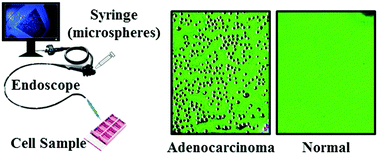An adhesion based approach for the detection of esophageal cancer
Abstract
Esophageal cancer has a 5 year survival rate of ∼20%. This dismal prognosis is due, in part, to the fact that esophageal cancer often presents at a late stage. Thus, there is a critical need for assays that enable the early detection of cancerous tissue within the esophagus. The luminal surface of the esophagus expresses signature molecule(s) at sites of transformation providing an avenue for the development of in situ assays that detect neoplastic growth within the esophagus. An attractive approach, receiving increased attention, is the endoscopic administration of particles conjugated with ligands to signature molecules present on transforming tissue. Detection of the particles within the esophagus, post-washing, would indicate the presence of the signature molecule and thus transforming tissue. In this work, we utilized cancerous and normal esophageal cells to provide in vitro proof of principle for this approach utilizing ligand-conjugated microspheres and demonstrate the need, and provide the framework for, engineering this technology. Specifically, the study (i) reveals selective increased expression of signature molecules on cancerous esophageal cells relative to normal cells; (ii) demonstrates selective binding of ligand-conjugated microspheres to cancerous esophageal cells relative to normal cells; (iii) demonstrates that the selective recognition of cancerous, relative to normal esophageal cells, is highly dependent on the biophysical design of the assay; and (iv) advocates utilizing the knowledge from the field of cell adhesion as a guide for the effective development of ligand-conjugated particle-based schemes that seek to detect esophageal oncogenesis in situ.



 Please wait while we load your content...
Please wait while we load your content...